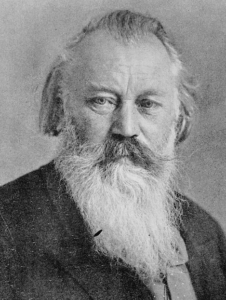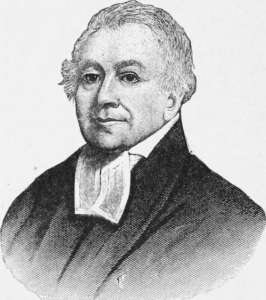REVIEW POTPOURRI: Johannes Brahms
 by Peter Cates
by Peter Cates
Johannes Brahms
Brahms Symphony 1 – Hermann Scherchen conducting the Vienna State Opera Orchestra; Classaphonic-CL-68. 12 inch lp, recorded mid to late 50s.
Johannes Brahms was already sketching a First Symphony in 1853 as his friend Robert Schumann was praising the then young composer as the great new hope in music who would provide “yet more wondrous glimpses into the mysteries of the world of the spirit.” The sketches eventually grew into the magnificent First Piano Concerto in 1857.
Another 19 years elapsed when Brahms presented his First Symphony in its 1876 World Premiere in a rural town in Germany where several friends were eagerly awaiting its performance.
The Symphony met with resounding success and has been performed and recorded countless times since then, being still a favorite with audiences. Having already admitted in earlier columns that Brahms has been my favorite composer for decades, I am certainly biased in finding things to enjoy in this recording, as with batches of other Brahms 1sts in my collection, whether good, bad or indifferent.
Hermann Scherchen conducted a performance that was uniquely captivating for its foreboding grandeur in the opening movement, its sweet sentiment in the second movement, the dancing, slightly melancholy delicacy in the 3rd movement and the jubilation in the concluding 4th movement. Scherchen also speeded up tempos even more quickly than Leonard Bernstein and Eugen Jochum on their justly acclaimed recordings towards the end of the 4th Finale- he could be perverse with tempos and phrasing- but this recording ended up being such a pleasure that I have played it at least 4 times since yesterday.
John Josselyn
The adventurous English aristocrat John Josselyn (1608-1675) traveled to New England twice, 1638 and 1663, and his massively detailed An Account of Two Voyages to New-England provided ground breaking research on animals, plants and native American life.
An example – he wrote interestingly about the homes in tribal villages, as conveyed in the following sentence:
“Their houses which they call Wigwams, are built with Poles pitched into the ground of a round form for most part, sometimes square, they bind down the tops of their poles, leaving a hole for smoke to go out at, the rest they cover with the bark of trees, and line the inside of their Wigwams with mats made of rushes painted with several colors, one good post they set up in the middle that reaches to the hole in the top, with a staff across before it at a convenient height, they knock in a pin on which they hang their Kettle, beneath that they set up a broad stone for a back which keepeth the post from burning; round by the walls they spread their mats and skins where the men sleep whilst the women dress their victuals, they have commonly two doors, one opening to the South, the other to the North, and according as the wind sits, they close up one door with bark and hang a Dears skin or the like before the other.”
Josselyn also told tall tales about seeing pre-historic creatures such as sea lions and serpents and spotting a mermaid or two. In addition, he portrayed the harsh deadly New England landscape and climate as heaven on earth.
There is an anecdote where he started chewing a wasp’s nest, thinking it was a pineapple. His face became so swollen and disfigured that his friends recognized him only by his clothes.
Josselyn’s second visit in 1663 lasted several years until he eventually returned to England where he first wrote New-England Rareties Discovered in 1672 and An Account two years later.
In 1675 John Josselyn died at the age of 67, fulfilling a French proverb he lived by – “Travail where thou canst, but dye where thou oughtest, that is, in thine own Countrey.”
D.L. Miller
A few years ago, I wrote about the 99 cent Somerset/Stereo Fidelity LPs created by the Pennsylvania businessman D.L. Miller back in 1957. In addition to the classical recording sessions he brokered with such orchestras as the London and Hamburg Philharmonics, Miller created an immense and very profitable catalog of LPs by the 101 Strings which were inevitably transferred to cassettes and CDs. Three particular titles- With Love from London, Symphony for Lovers and Gypsy Campfires – were part of my parents otherwise small record collection.
Nelson Riddle conducted the 101 Strings in one of their finest recordings, one I’ve played numerous times.
Miller sold the label to an English businessman who changed its name to Alshire. A cassette release, The Best of 101 Strings (Alshire, ALSC-5373), features a dozen rhythmically pulsating arrangements of such pop staples as Moon River, I Left My Heart In San Francisco, The Way We Were, Lara’s Theme from Doctor Zhivago, etc.
* * * * * *
I highly recommend the recently streamed film Conclave, which depicts the secret proceedings at Vatican City as the Cardinals are choosing a new Pope. Ralph Fiennes heads a superb cast as the chief moderator of the proceedings.
Responsible journalism is hard work!
It is also expensive!
If you enjoy reading The Town Line and the good news we bring you each week, would you consider a donation to help us continue the work we’re doing?
The Town Line is a 501(c)(3) nonprofit private foundation, and all donations are tax deductible under the Internal Revenue Service code.
To help, please visit our online donation page or mail a check payable to The Town Line, PO Box 89, South China, ME 04358. Your contribution is appreciated!




Leave a Reply
Want to join the discussion?Feel free to contribute!